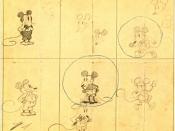As I look back into my childhood, I remember my friends and I were playing a game of football outside on a sunny day. Then, when the other team kicked the ball, it landed beyond the old, gray, and dull wooden fence. This fence had not been painted for ages, and if you ran your hand against it, you would end up with slivers. There were boards missing, and we could see our football. It had landed in some tall weeds, which is what most of the yard consisted of, with a lot of bare spots next to the house. The house looked like an abandoned, rundown shack. The windows were really murky and the paint on the house was curling. We then looked at each other and decided it was not worth going to get our ball because the house looked scary.
As I look back on this event, I realize that it was kind of silly.
We could have gotten that ball, if our preemptive judgments hadn't stopped us. The guy that lives in that house is a nice guy but doesn't really follow social "norms." He doesn't take care of his yard or house, and he doesn't come outside much. Since he doesn't follow these norms, we make false judgments.
It wasnÃÂt just us that made these false accusations. As people walk by, they look at his house with disgust. Teenagers poke fun by vandalizing his property. In this society, we don't accept people that are out of the ordinary. We avoid eye contact with these people. To us, they are the outsiders that we created by exiling them from society for not following social norms.
Everything we grow up with is now systematic. Standardized tests, systematic government, busy schedules; a successful life depends on how you deal with all these systematic things. Systematic things are only one way to do things. Some people are bad at doing things this way and thus, are different and are not as successful in life as other people.
In elementary school, they tell us to be different, to be unique. One of my friends, probably the most unique kid I ever knew, became a social outcast. People said bad things about him and gave him mean looks. Everyday, he would be bullied, ignored, bumped, and even made fun of all because he did not follow the recipe in the cookbook of society. He never won any art contests, even though he was astonishing when it came to art, because barely anyone would vote for him. All of this because he doesn't fit in and because he is different.
Society has countless norms we follow, most of the time unconsciously. That's the way we were brought up. We were told when we could do this or when we should not do that. But what if you were an orphan and never acquired these norms? What if you were a foreigner who had grown up away from these norms and therefore did things differently because the norms of your country were different from those in other countries? Either way, you would be rejected from society.
My parents are Chinese and emigrated from China. I can see they do not know all of the social norms of America. When they do certain things, people look curiously or they laugh because they are doing it differently than they would. Sure they picked up some things, but I feel our family is still not in unison with the community as the rest of our neighborhood.
Since I came here from China at a young age with my parents not knowing all the societal norms of this country, I had to learn them the hard way. Every now and then, I'd learn a new one and someone would tell me and I would feel embarrassed that I did not know I should not have said or done that. I got most of them down, but every now and then one slips or comes up.
Societal norms do not just affect us; they also influence our kids. Often you hear them say things that shouldn't be said. They do not know better because they haven't picked up on society's norms. They usually say things that can be rash or hurtful, which then is followed by a "shh" from one of their parents. After a football game that I had played in, we had lost and as we were walking off the field, a kid yelled "Go Lakers! Way to lose yay!" Of course, he probably meant well with that statement, but his mom quickly hushed him. All the time, you hear kids point out people that do not fit our standards as normal. "Hey mommy, why is that person so and so," is the most common thing you hear. But if you were the person to hear that, it would feel like a stab at your self-confidence.
I conducted a survey of forty people and found that ninety-five percent believe that social outcasts make themselves that way. Maybe they do, but I think society and its norms play a big role on it. In high school, the majority of social outcasts are intelligent, thus making them different from the rest of the population.
Some of the most famous people in the world started out as outcasts, such as Albert Einstein. He was Jewish, which everybody hated him for being Jewish because he lived in Germany. He was also dyslexic, so he failed most of his subjects. Walt Disney was a social outcast. He did a lot of drugs and people thought he was insane. People saw him sit in the corner and draw a cartoon mouse called Mortimer. But then it became a hit and is now called Mickey Mouse. Social outcasts become better equipped in the long run to take what life throws at them since they grow up having to deal with hardships and not being accepted, which makes them self-reliant.
As society grows, people have more norms to follow, which makes our society more the same. We need social outcasts as a part of this society even though they donÃÂt really follow the ÃÂrules.ÃÂ In order for our society to be successful, we need to accept everyone. Deep inside, we are all humans, and the way we choose to live our life cannot change that.






V good
I really enjoyed reading this..it draws attention to an issue that we all deal with on a daily basis whether we know it or not..Well written and well organized..
0 out of 0 people found this comment useful.